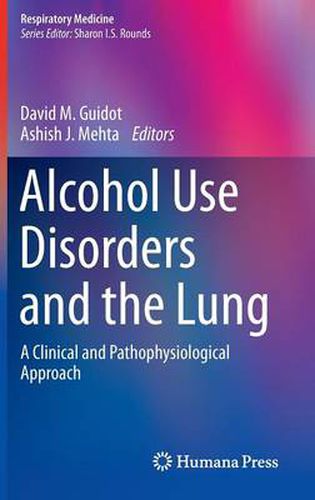Readings Newsletter
Become a Readings Member to make your shopping experience even easier.
Sign in or sign up for free!
You’re not far away from qualifying for FREE standard shipping within Australia
You’ve qualified for FREE standard shipping within Australia
The cart is loading…






This title is printed to order. This book may have been self-published. If so, we cannot guarantee the quality of the content. In the main most books will have gone through the editing process however some may not. We therefore suggest that you be aware of this before ordering this book. If in doubt check either the author or publisher’s details as we are unable to accept any returns unless they are faulty. Please contact us if you have any questions.
Alcohol Use Disorders and the Lung: A Clinical and Pathophysiological Approach is an excellent resource for clinicians who care for individuals affected by alcohol use disorders in diverse settings. Although alcohol abuse alone does not cause acute lung injury, it renders the lung susceptible to dysfunction in response to the inflammatory stresses of sepsis, trauma, and other clinical conditions recognized to cause acute lung injury. In parallel, these same pathophysiological effects of alcohol abuse significantly increase the risk of a wide range of serious lung infections. Many clinicians involved in the primary treatment of alcohol use disorders, such as addiction psychiatrists, will find this text of interest as it will expand their understanding of the health consequences of alcohol use disorders. In parallel, clinicians who specialize in pulmonary and/or critical care medicine will have a unique resource that provides a comprehensive review of the pathophysiology of alcohol-related lung disorders and insights into evolving therapeutic options in these vulnerable individuals. Alcohol Use Disorders and the Lung: A Clinical and Pathophysiological Approach fills a gap in the literature and presents the evolving clinical research that may soon lead to novel therapies that can improve lung health in individuals with alcohol use disorders and co-existing conditions such as HIV infection.
$9.00 standard shipping within Australia
FREE standard shipping within Australia for orders over $100.00
Express & International shipping calculated at checkout
This title is printed to order. This book may have been self-published. If so, we cannot guarantee the quality of the content. In the main most books will have gone through the editing process however some may not. We therefore suggest that you be aware of this before ordering this book. If in doubt check either the author or publisher’s details as we are unable to accept any returns unless they are faulty. Please contact us if you have any questions.
Alcohol Use Disorders and the Lung: A Clinical and Pathophysiological Approach is an excellent resource for clinicians who care for individuals affected by alcohol use disorders in diverse settings. Although alcohol abuse alone does not cause acute lung injury, it renders the lung susceptible to dysfunction in response to the inflammatory stresses of sepsis, trauma, and other clinical conditions recognized to cause acute lung injury. In parallel, these same pathophysiological effects of alcohol abuse significantly increase the risk of a wide range of serious lung infections. Many clinicians involved in the primary treatment of alcohol use disorders, such as addiction psychiatrists, will find this text of interest as it will expand their understanding of the health consequences of alcohol use disorders. In parallel, clinicians who specialize in pulmonary and/or critical care medicine will have a unique resource that provides a comprehensive review of the pathophysiology of alcohol-related lung disorders and insights into evolving therapeutic options in these vulnerable individuals. Alcohol Use Disorders and the Lung: A Clinical and Pathophysiological Approach fills a gap in the literature and presents the evolving clinical research that may soon lead to novel therapies that can improve lung health in individuals with alcohol use disorders and co-existing conditions such as HIV infection.